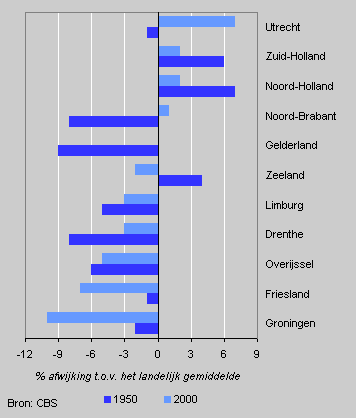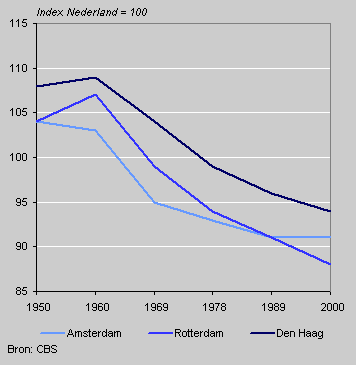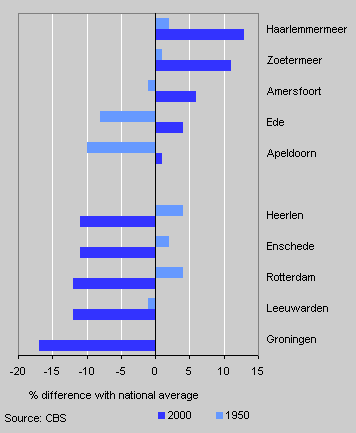Large regional differences in income in last fifty years

The differences in income between provinces changed substantially in the period 1950-2000. The average disposable income in the coastal provinces rose less strongly than on a national scale. Income in the inland provinces on the other had rose by relatively more. Income developments have lagged in many large cities.
North Brabant and Gelderland have caught up
At the beginning of the fifties, disposable income in the provinces North Brabant, Gelderland and Drenthe was 8 to 9 percent below the national average. Fifty years later these provinces had almost made up this arrears.
The provinces Groningen and Friesland are lagging behind average income today. In 2000 the income in these provinces was 10 and 7 percent respectively below average. The position of Groningen, in particular, deteriorated strongly in the space of fifty years.
Income position of income recipients by province

North and South Holland no longer top the list
In the west of the country, too, the development differs strongly between provinces. North and South Holland had the highest income in 1950, but have lost their place at the top. In 2000 the province of Utrecht had the highest disposable income by far.
Strong deterioration for three largest cities
Income development is lagging strongly in the municipalities of Amsterdam, Rotterdam and The Hague. While income in these cities was well above the national average in the fifties, this lead diminished in the sixties and seventies and by the late seventies all three were trailing behind the average. In 2000 disposable income in the three largest Dutch cities was 6 to 8 percent lower than average.
Income development and income recipients in Amsterdam, Rotterdam and The Hague

High and low incomes
The percentage of high incomes in Amsterdam, Rotterdam and The Hague has decreased in the last decades. Many high income households have left the big cities to settle in the surrounding municipalities. This process of suburbanisation has led to changes in the composition of the population in the big cities, where more and more single people and foreigners are making their homes. As the income of the latter groups is relatively low the percentage of low income households in these cities is increasing.
Similar course for other big cities
The income position of many other big cities has also deteriorated since the end of the seventies. Groningen and Enschede, in particular, have started to lag behind. And in the south of the country this is the case for Heerlen. Apeldoorn and Haarlemmermeer, on the other hand have become more prosperous.
Income development and income recipients in some other big cities

Hans Kasperski
Source: StatLine